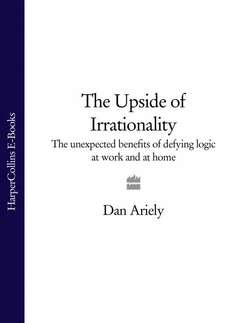Читать книгу The Upside of Irrationality: The Unexpected Benefits of Defying Logic at Work and at Home - Дэн Ариели, Dan Ariely, Dan Ariely - Страница 16
Where Do We Go from Here?
ОглавлениеThese findings make it clear that figuring out the optimal level of rewards and incentives is not easy. I do believe that the inverse-U relationship originally suggested by Yerkes and Dodson generally holds, but obviously there are additional forces that could make a difference in performance. These include the characteristics of the task (how easy or difficult it is), the characteristics of the individual (how easily they become stressed), and characteristics related to the individual’s experience with the task (how much practice a person has had with this task and how much effort they need to put into it). Either way, we know two things: it’s difficult to create the optimal incentive structure for people, and higher incentives don’t always lead to the highest performance.
I want to be clear that these findings don’t mean that we should stop paying people for their work and contributions. But they do mean that the way we pay people can have powerful unintended consequences. When corporate HR departments design compensation plans, they usually have two goals: to attract the right people for the job and to motivate them to do the best they can. There is no question that these two objectives are important and that salaries (in addition to benefits, pride, and meaning—topics that we will cover in the next few chapters) can play an important role in fulfilling these goals. The problem is with the types of compensations people receive. Some, such as very high bonuses, can create stress because they cause people to overfocus on the compensation, while reducing their performance.
TO TRY TO get a feeling for how a high salary might change your behavior and influence your performance, imagine the following thought experiment: What if I paid you a lot of money, say $100,000, to come up with a very creative idea for a research project in the next seventy-two hours? What would you do differently? You would probably substitute some of your regular activities with others. You would not bother with your e-mail; you wouldn’t check Facebook; you wouldn’t leaf through a magazine. You would probably drink a lot of coffee and sleep much less. Maybe you would stay at the office all night (as I do from time to time). This means that you would work more hours, but would doing any of this help you be more creative?
Hours spent working aside, let’s consider how your thought process would change during those critical seventy-two hours. What would you do to make yourself more creative and productive? Would you close your eyes harder? Would you visualize a mountaintop? Bite your lips to a larger degree? Breathe deeply? Meditate? Would you be able to chase away random thoughts more easily? Would you type faster? Think more deeply? Would you do any of those things and would they really lead you to a higher level of performance?
This is just a thought experiment, but I hope it illustrates the idea that though a large amount of money would most likely get you to work many hours (which is why high payment is very useful as an incentive when simple mechanical tasks are involved), it is unlikely to improve your creativity. It might, in fact, backfire, because financial incentives don’t operate in a simple way on the quality of output from our brains. Nor is it at all clear how much of our mental activity is really under our direct control, especially when we are under the gun and really want to do our best.
NOW LET’S IMAGINE that you need a critical, lifesaving surgery. Do you think that offering your medical team a skyhigh bonus would really result in improved performance? Would you want your surgeon and anesthesiologist to think, during the operation, about how they might use the bonus to buy a sailboat? That would clearly motivate them to get the bonus, but would it get them to perform better? Wouldn’t you rather they devoted all of their mental energy to the task at hand? How much more effective might your doctors be in what the psychologist Mihály Csíkszentmihályi called a “state of flow”—when they are fully engaged and focused on the task at hand and oblivious to anything else? I’m not sure about you, but for important tasks that require thinking, concentration, and cognitive skill, I would take a doctor who’s in a flow state any day.
